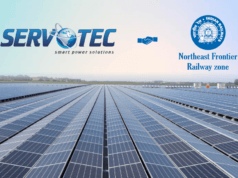
- Cooperation aims to test renewable fuels at the Rya CHP plant located in the energy port of Gothenburg
• First phase with Göteborg Energi is to validate 3D-printed burners at the Rya plant
By 2030, the ambition is that all district heating in Gothenburg, Sweden, will be produced by renewable or recovered energy sources. With this in mind Göteborg Energi and Siemens have come together in a cooperation agreement with the aim of testing state-of-the-art gas turbine technology that enables the operation of renewable fuels in the Rya combined heat and power (CHP) plant, which is today
powered by natural gas.
As a first step an SGT-800 test turbine has been installed at the Rya combined heat and power plant (CHP) for the validation of 3D printed burners which would then allow for testing of different fossil-free fuels in the plant. The production of gas turbine burners using additive manufacturing (AM) makes a decisive contribution to accelerating the research and development process for new technologies that contribute to a greener energy supply.
Recently, the AM team within Siemens Gas & Power initiated the development of a new accelerated validation process for new technologies and components and now this process is already working in the Rya CHP plant. The special test engine is installed at the plant to support new developments.
“The Rya CHP plant plays an important role in Gothenburg’s electricity supply,” said Alf Engqvist, CEO of Göteborg Energi. “Working together with Siemens we want to explore the possibilities for the conversion of both electric power and heat production as pieces of the puzzle in our work for fossil-free energy independence.”
There is global demand for new climate-smart solutions and Siemens’ technology and solutions are addressing this need. For example, converting a coal power plant into a modern gas-fired combined cycle power plant, such as the Rya CHP plant in Gothenburg, can reduce carbon dioxide emissions by about two-thirds. By co-burning natural gas with an increasing share of hydrogen or biofuel, emissions can then be further reduced gradually.
“In our collaboration with Göteborg Energi we see the possibility to verify the viability of several different renewable fuels, such as hydrogen, on a larger scale, first in Sweden and then in other parts of the world,” said Thorbjoern Fors, CEO Siemens Distributed Generation and Oil & Gas Services Business. “With this cooperation, Göteborg Energi and the Rya CHP plant are driving innovation toward new solutions and green power together with us.
“Our goal is to run the SGT-600, -700 and -800 gas turbine combustors 100 percent fossil free, for example with hydrogen, in the near future,” continued Fors. “This is a unique cooperation between Siemens and a customer that can demonstrate the varied possibilities for sustainable and cost-effective fuels as our industry and societies look to reduce carbon emissions around the world.”
The Rya combined cycle power plant was delivered turnkey by Siemens 2006 and includes three SGT-800 gas turbines.
Siemens Gas and Power (GP) is a global pacesetter in energy, helping customers to meet the evolving demands of today’s industries and societies. GP comprises broad competencies across the entire energy value chain and offers a uniquely comprehensive portfolio for utilities, independent power producers, transmission system operators, the oil and gas industry and other energy intensive industries. Products, solutions, systems and services address the extraction, processing and the transport of oil and gas as well as power and heat generation in central and distributed thermal power plants, power transmission and grid stability, as well as energy transition technologies including storage. With global headquarters in Houston in the U.S. and around 63,000 employees in over 80 countries, Siemens Gas and Power has a presence across the globe and is a leading innovator for the energy systems of today and tomorrow, as it has been for more than 150 years.
Siemens AG (Berlin and Munich) is a global technology powerhouse that has stood for engineering excellence, innovation, quality, reliability and internationality for more than 170 years. The company is active around the globe, focusing on the areas of power generation and distribution, intelligent infrastructure for buildings and distributed energy systems, and automation and digitalization in the process and manufacturing industries. Through the separately managed company Siemens Mobility, a leading supplier of smart mobility solutions for rail and road transport, Siemens is shaping the world market for passenger and freight services. Due to its majority stakes in the publicly listed companies Siemens Healthineers AG and Siemens Gamesa Renewable Energy, Siemens is also a world-leading supplier of medical technology and digital healthcare services as well as environmentally friendly solutions for onshore and offshore wind power generation. In fiscal 2019, which ended on September 30, 2019, Siemens generated revenue of €86.8 billion and net income of €5.6 billion. At the end of September 2019, the company had around 385,000 employees worldwide. Further information is available on the Internet at www.siemens.com.











